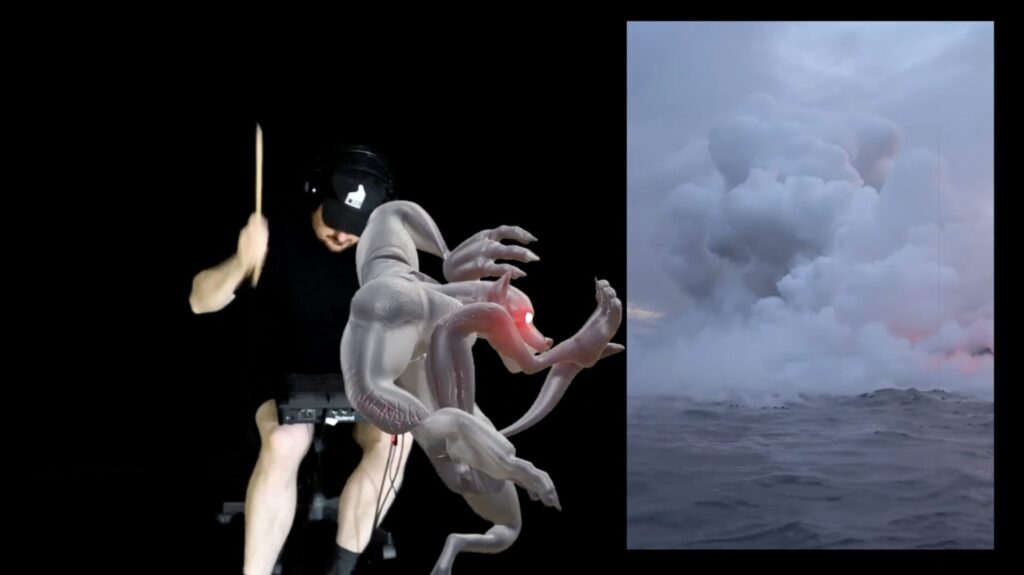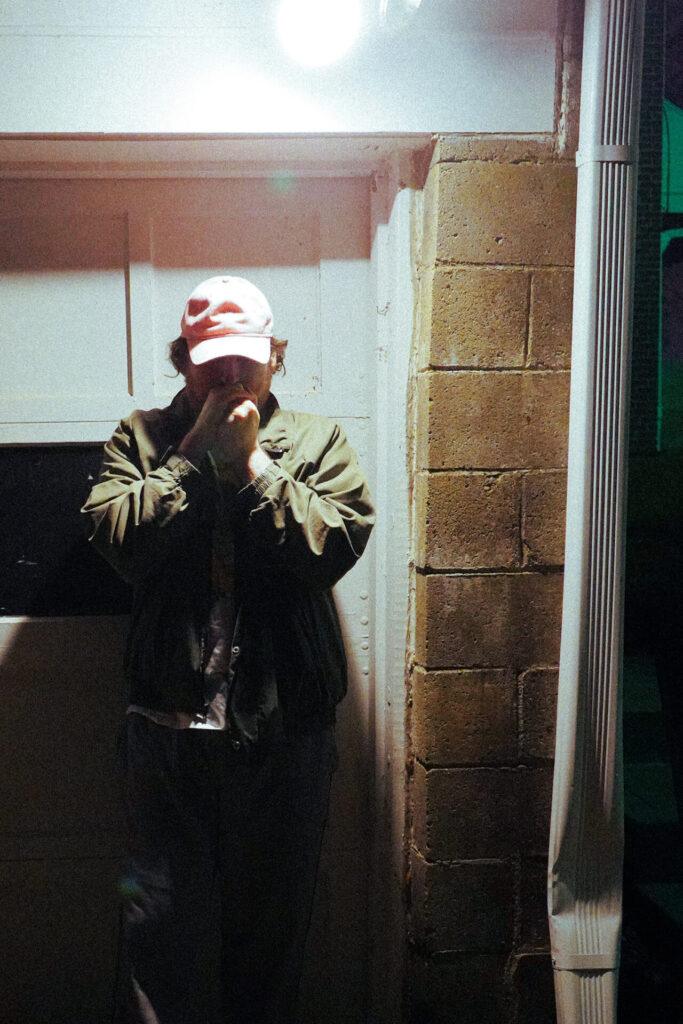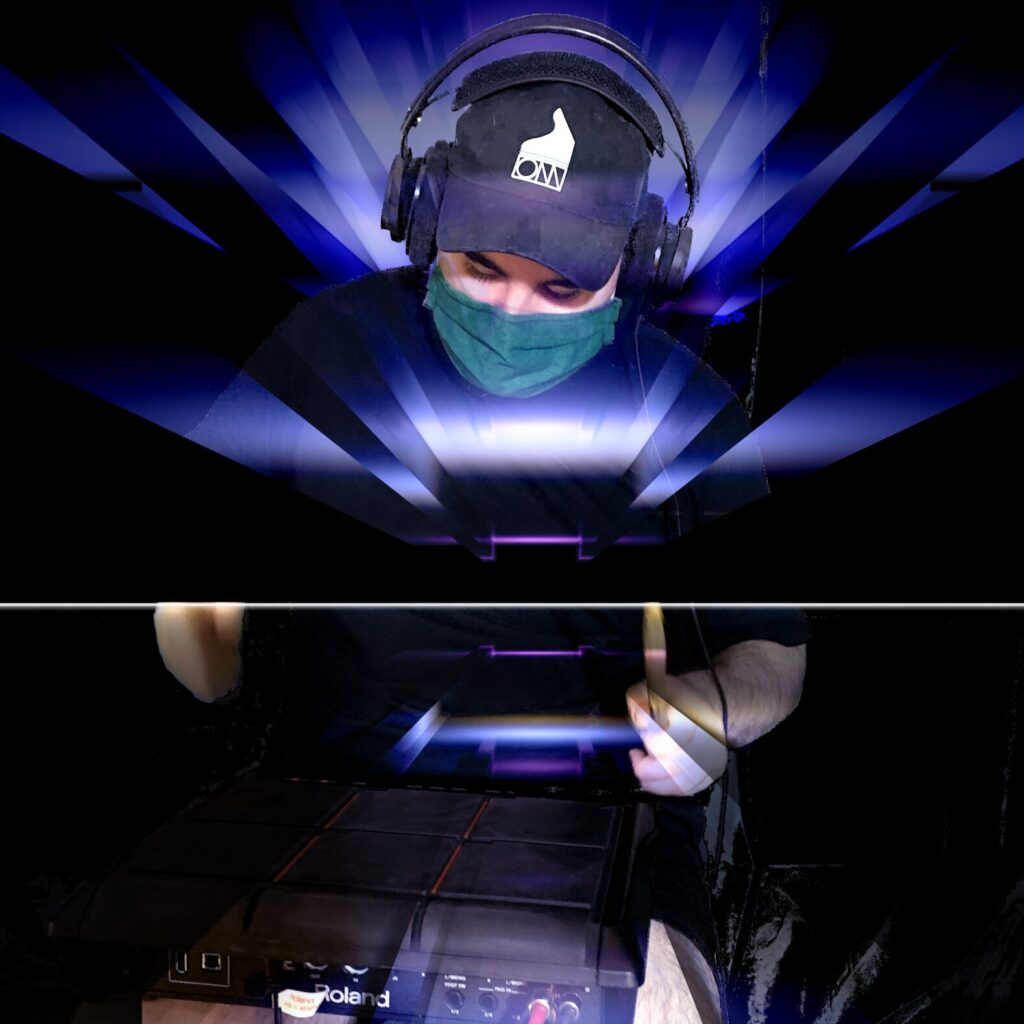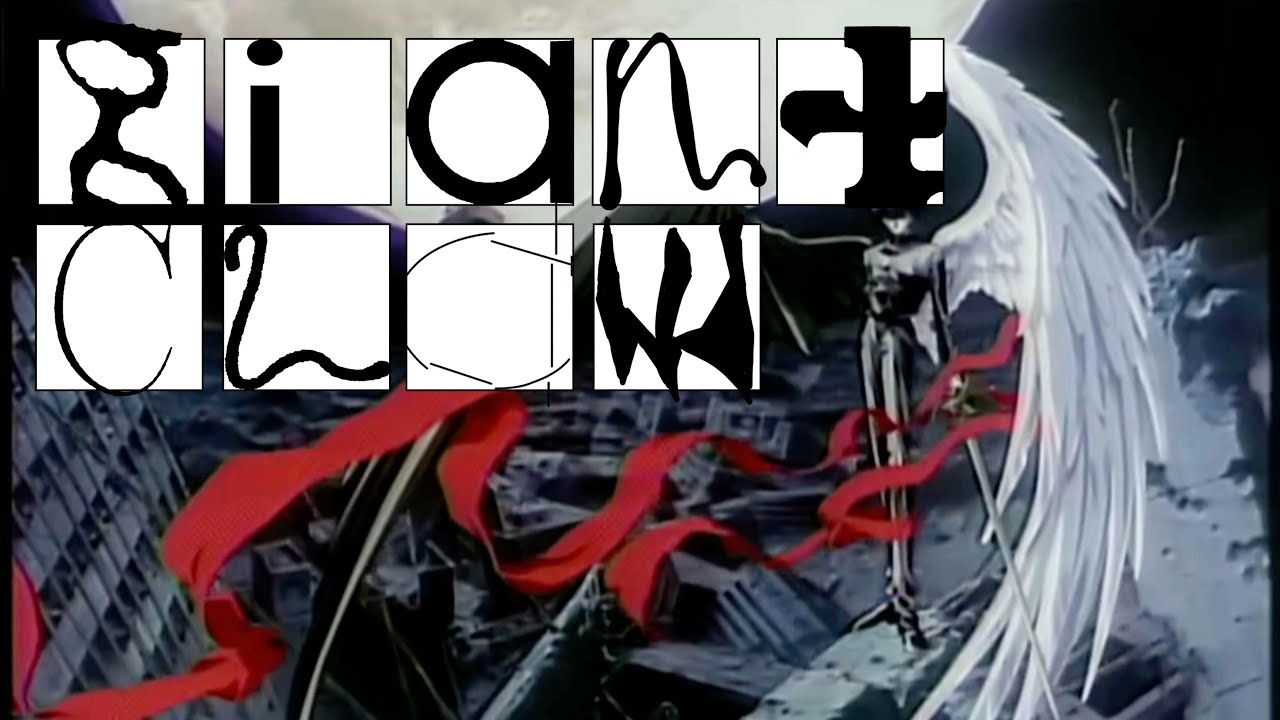We’re an hour into our call when Keith Rankin begins waxing poetic about the Chili’s Babyback Ribs jingle. “I’ve watched that so many times,” he says, beaming about the percussive acapella soundtrack. “Something about it – the effort – is just incredible.” As if sensing the ridiculousness of this sentiment, he gets overcome with laughter, before elaborating: “The commercialisation is stampeded by the musicians’ spirit. The flaming hot human spirit is blazing through this Chili’s commercial.”
We’ve arrived at this juncture, improbably, while talking about Rankin’s latest record as Giant Claw – the phenomenal Decadent Stress Chamber. For the last 15 years, Rankin has towered over vaporwave, and various other outsider strains of dislocating electronic music. Before this present moment, his solo work as Giant Claw was unclassifiable; the project could live as anything from the futuristic tilt on avant-garde neoclassical compositions on 2021’s Mirror Guide, to the glitchy, skittering haze on 2014’s Deep Web.
But Decadent Stress Chamber is an entirely new realm. Warped microsnippets of isolated pop vocals lay the bedrock for rippling waves of synths, bellowing bass thrums, and digital snare rushes. For the first time, the tracks are structured like pop songs, albeit an alien reinterpretion of the form. There are swells, big codas, and even sections resembling choruses, verses, and middle eights. Small phrases or unintelligible batches of syllables repeat as if they are hooks from an alternate dimension, creating a new language of isolated sentiments. The listener may be able to pick out a fragment or two, but the connective tissue is absent, leaving the words free-associative, defying easy interpretation or narrative. The closest points of reference are the early works of Oneohtrix Point Never, or the vaporwave of the 2010s when he was part of the collective Death’s Dynamic Shroud. But the exactness of Decadent Stress Chamber rests in a liminal space all its own – more welcoming and immediate than Rankin’s headier past solo material, but just peculiar and idiosyncratic enough to be more than mere accessible curiosity.
For Rankin, the record is a way to carve out something completely unique from a familiar form he grew up with. He mentions internalising the structures of pop music as a kid, listening to artists like Whitney Houston on the radio, and the pull of music in that field never stopped, even as his work as Giant Claw grew more experimental. “Over time, I’ve wanted to play with it more. I’ve thought, ‘What if I pushed this further and leaned into the form?’”
Rankin has continued to hold a fascination with pop music that carries an “effortless personality and charisma” in recent years, citing Chappell Roan’s ‘Good Luck, Babe!’, NewJeans’ ‘Super Shy’, and the “ineffable spirit” of PinkPantheress (especially ‘Capable Of Love’) as exciting examples so far this decade. But he also harbours just as much morbid fascination for what he sees as more vapid, hyper-commercialised pop today. “I’m very interested in why the hell people are doing this,” he explains, “almost as a documentary of what’s going on. I listened to the new Katy Perry album, for instance. I was just like, ‘Why did they make these decisions? I wish I could be a fly on the wall for the recording of this.’”
It’s this enduring fixation on pop as a cultural entity, and the capacity that the genre has for that unbridled human spirit, that’s stayed at the center of Rankin’s mind as he’s tried his own hand at the genre. He uses the term “free-pop” to refer to the room he has to explore – “the form, but removing the industry part” – beyond where the industry of pop music is “more shackled.” By releasing on his own label, with no one above him to dictate what sells well, Rankin’s form of pop music can be anything, go anywhere, borrow from whatever other sounds call to him. “I think certain musical ideas can have more listener impact when it’s in a familiar form,” he says. “I’ll play my sister Merzbow and she’s done within three seconds. But if you put some of this aesthetic into a pop song, it eases the ideas, lubricates people’s minds to be able to explore more.”

Of course, the issue we’ve been circling around is pop music’s role as a commercial product, especially when it comes to the biggest artists in the game. It’s a subject that’s been on Rankin’s own mind for as long as he’s been invested in pop: “It can be difficult to separate [pop music and commerce], because radio pop music as we know it evolved with 20th century commerce, so there’s an inextricable link between the two.” But he’s just as mindful of how time erodes the commercial immediacy of art, and how the most enduring creations see the pureness of their effort shine through the circumstances in which they were birthed. “Over time, the commerce part fades away, and what’s left is just the human endeavour. You start to recognise that, even in these commercial situations, the human mind was still at play, expressing itself.” And so, Rankin invokes the Chili’s jingle to illustrate his point.
To home in on this element of pop, Rankin drew primarily from vocal samples. “I’m really drawn to a certain vocal quality, where it almost feels like the person’s singing in their talking voice,” he says. “A very nonaffected vocal tone.” What he’s especially drawn to are passages whose sentiments are only briefly explored in their original contexts, and the lengths he can go to in order to draw out what was always there. “The form itself is not allowing our minds enough time to process the real meaning of this sentiment.”
He provides an example via the record’s third track ‘Desire Despair’, a thundering melodrama of emphatic synths and guitars that hinges on a sample from Annie Lennox’s ‘No More I Love You’s’. Oscillating between pitch-shifted manipulations of the Eurythmics frontwoman speaking the track’s two titular words, each iteration of the words takes on a fraying anguish, the pleading increasing restlessness with every repetition. “I relistened to the Annie Lennox song,” Rankin says, “and the lyric goes by so quickly. This is kind of the early vaporwave mentality, where the sample is a brief sentiment in the pop song, but when you meditate on it, it’s like, ‘Damn, this is some heavy shit. Desire, despair’ – that is the core of a lot of people. You repeat it over and over, and it’s almost a mantra. You get in the mindset of, ‘What does this mean to me? How does this apply to me?’ It’s beautiful. When you’re just taking bits of music and putting it in different contexts, it’s like the hidden world in all music.”
When he alludes to that early vaporwave mindset with samples and recontextualisation, part of what he’s drawing from is his own experiences in that subculture. He brings up the sample he pulled for the opening track of I’ll Try Living Like This, the breakthrough record for Death’s Dynamic Shroud in 2015, which begins with an ethereal intonation: “Don’t suffer in silence”. It’s become something of a motto for the group’s fans, and is, at present, the only descriptive text for the album on Bandcamp. Its source? An ad for Midwest Hemorrhoid Treatment Center. “I just took the ‘don’t suffer in silence’ out of context,” Rankin grins, breathless with laughter. And yet, the words still take on a new dimension of beauty and empathy in their place on this song. It’s all a matter of perspective, unearthing the sentiment beneath.
On Decadent Stress Chamber, that sometimes involves Rankin jerking the wheel to move in a completely different direction, if a song calls for it. “That’s a compositional device I enjoy: introducing a tag at the end that ramps up the excitement. A lot of times, I’m making a song, and I’ve listened to it so much that I’m like, ‘Damn… it’s kind of boring me now.’ For my own sanity, I have to add some burst of excitement at the tail end of the song. A lot of times, when I do that, the spark of creativity ignites again.” ‘Desire Despair’ is one such track that follows this approach, all but abandoning the Lennox vocals in its final minute for a triumphant rush of synths and gated reverb drums entirely unlike any previous section of the song. But it’s ‘No Life’ that’s the most radical example of this, fitfully pivoting between four-on-the-floor, a subdued shuffling beat, and garage-y build, before turning hard into what could pass as a heavy metal climax, all blast beats and howling guitars. “I just wanted to make a pop song that shifts,” he explains of building that moment. “It’s almost like the verse/chorus is the shift in everything – in mood, in genre.” Even now, the thrill of that sudden turn hasn’t faded, and he notes it as one of his favorite moments on the record.

What Rankin gets at with this specific moment is part of a greater aim: the pop form not being beholden to a single genre, and its latent freedoms to incorporate as many other sounds as possible. The conversation shifts to mirror this, when he brings up how his love of prog rock goes as far back as his childhood love for radio pop. He views prog as an expansion of the pop structure, “pushing it a little outside tighter pop music, like, ‘Let me bloat it out a little here and see how far it can go.’” The place this is most transparently felt is the closing suite of Decadent Stress Chamber, a series of three tracks that introduce a vocal motif, crescendo beyond its initial form, and then crash back into the leitmotif for one final push. “A lot of prog is so in its own head and ass in a great way, which I relate to,” Rankin muses. “A piece like that can be really special, like Close To The Edge by Yes, where you’re in the world, it keeps the dynamics building, and you have to be invested in the album to really get the payoff.”
The bigger-picture structural gambit of the record’s closing stretch has ties to another realm that Rankin adores: experimental compositions from the likes of Philip Glass, Steve Reich, Terry Riley, and the Geinoh Yamashirogumi Orchestra. He sees these composers’ use of repetition to sustain a feeling as something not too far removed from what prog accomplishes, making special mention of the repetitive mallet work of Glassworks and the gamelan-style orchestration in the Akira score. Unexpectedly, within the framework of our discussions of pop music, we begin considering the core motif of Music For 18 Musicians as a kind of unusual refrain of its own. “That’s an impulse that’s dominated the fringes of popular music, in many different forms,” Rankin notes the “impulse to repeat and break out of the compositional mould of constant shifts, and meditate on a part.”
Beyond any singular genre, though, this closing suite represents Rankin’s love for album-oriented music. Decadent Stress Chamber partially stems from a concerted effort that he and his partner Ellen Thomas – who created the art for the project – made to adjust their listening habits regularly, engaging with full records as active subjects of attention, uninterrupted, unimpeded, with no other distractions or tasks pulling them away. “It involves a lot of catharsis for me,” Rankin says of the endeavor, “in the same way that meditation probably does. It clears my racing thoughts.”
Rankin’s recognition of the power of music, and the pervasive human spirit that births it, are what inform his optimistic view about the current state of affairs. Despite the rapid changes in the artistic world amidst the slew of AI content, Rankin is doubtful of the staying power of AI-generated art. “This stuff falls away with time. The machinery of culture falls away, and, usually, the human underpinnings are what persevere. That machinery will eat itself and people will just lose interest, in my opinion.” He holds a similar view of the current music streaming landscape, potentially at a turning point as bands like Deerhoof and Xiu Xiu remove their work from Spotify in protest of its funding of AI military tech. “It feels like it’s a long time coming, honestly,” he says, noting how this moment arrives after a protracted “devaluation of art.”
When human culture radically shifts again, and we’re made to reckon with what endures from this era, what will we find ourselves coming back to with fond memories, with affinity? For Keith Rankin, it’s these deeply human efforts, and the poignancy of another living being building on those who came before. At one point, he mentions how – despite the prominent reiterative samples throughout the record – “usually the heart of a piece will still be [him] putting [his] hands on a keyboard, finding a spark with traditional composition.” It’s this ineffable spark that elicits what he refers to as “the healing factor” of music, against all the crushing intensity of the world. To complete the title of Decadent Stress Chamber’s closing suite, it’s this factor that makes life worth going through.
Decadent Stress Chamber by Giant Claw is out now via Orange Milk



